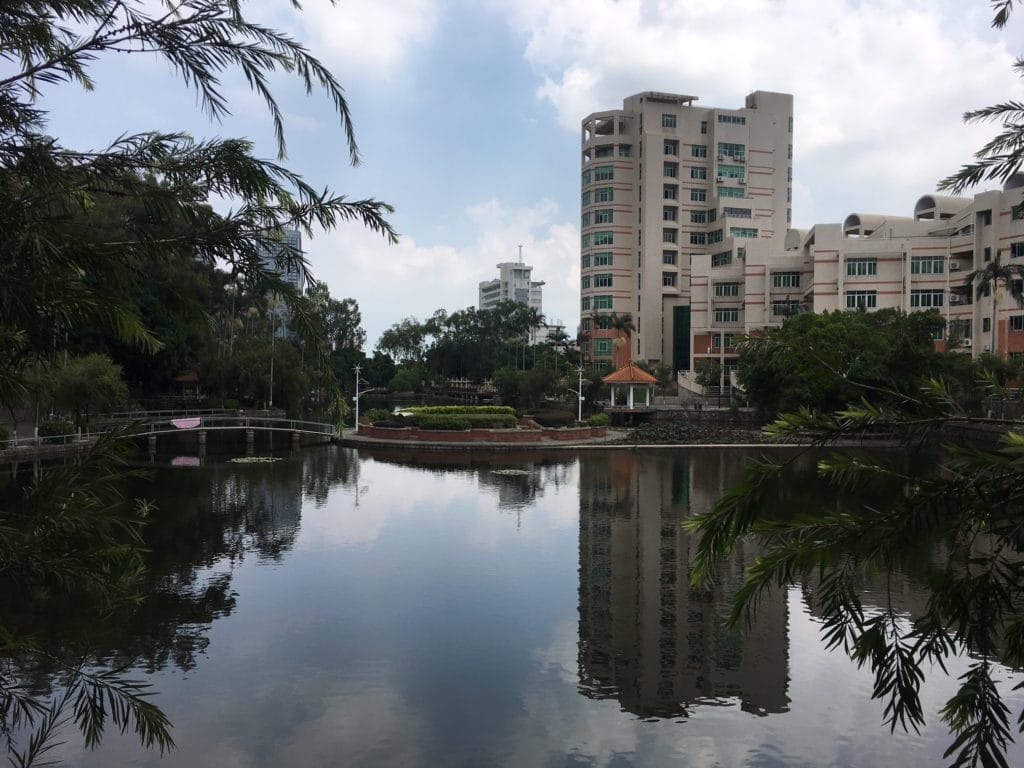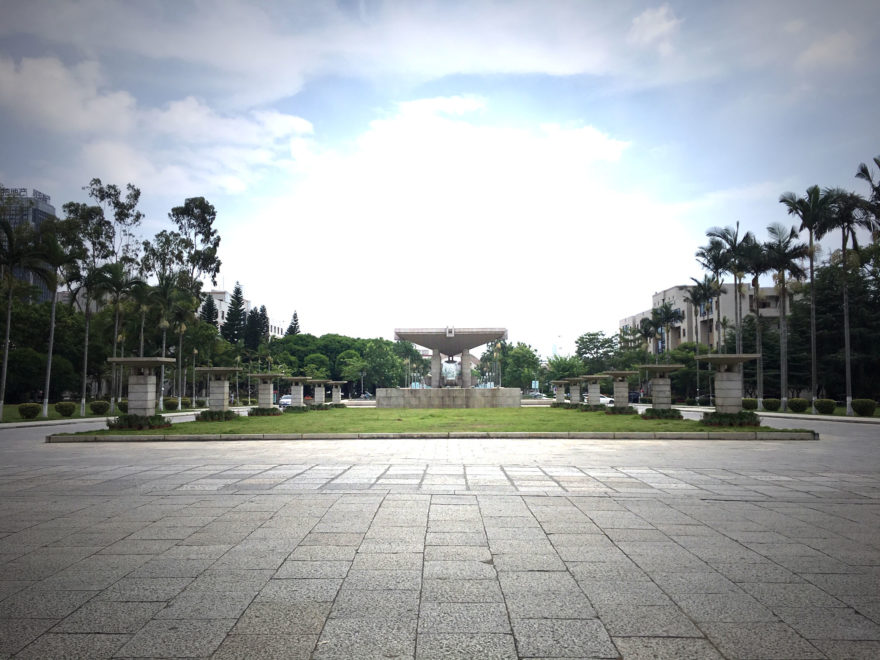Since 2014, WRD has been giving graduates with TESOL Certificates the opportunity to travel to Huaqiao University in China. For one academic year, new TESOL teachers are asked to teach English as Second Language (ESL) courses to Huaqiao undergraduates, with full living accommodations and a competitive salary. The courses usually taught by these teachers are speaking and writing based.
To learn more about this experience, we contacted Alex Nunes and Allie Gourley, two former participants in the program. Both were BA/MA students in WRD who pursued TESOL Certificates and continue to teach. Alex recently returned from teaching English in China last semester, and Allie is currently a First-Year Writing instructor at DePaul University. Here’s what they had to say about their time overseas in China.
The Experience
When questioned about the specific courses they taught in China, both Allie and Alex related that they taught largely Speaking & Listening, which neither quite expected. However, their introductions to the program were quite different.

“I did a lot of Listening & Speaking, although there were also writing courses and things like that,” said Alex. “It’s different out there. I learned what classes I was teaching three days before I started. I didn’t even know until I got there.”
“It ended up being—because of the way classes worked out—that I didn’t teach any writing classes,” said Allie. “I taught Speaking & Listening classes, which was a little different than what I thought I was going into. I get there, I get my class schedule, I see I have seven classes, and each of them are Speaking & Listening. In my head I’m thinking, ‘I did not bring anything to help me teach Speaking and Listening.’ It was a scramble to get materials together that I could use on top of the textbook that the university gave me.”
While a textbook was provided to them, Alex revealed that they were more or less free to use it as they saw fit.
“Every week, I would make my own PowerPoint, maybe try and incorporate the book, but they hated that book. It’s so boring,” said Alex, laughing. “You ever take a language learning class where you listen to the recorded conversation where they all speak very emphatically? Most of my students, they understood all this when they read it, but when it’s spoken like that they need the help. It’s never anything that they’re interested in either, which I think is totally important in order to learn a language—you have to have a reason.”
“I had a lot more freedom in the curriculum than I thought I was going to have going into a more structured society than what I think we would normally have here” said Allie. “The freedom to not use a textbook, to build a curriculum from scratch essentially.”
Adjustment to the New Environment
One of the natural challenges of travelling overseas for work is the adjustment period, particularly with the structure of the new workplace. Allie continued on about the differences she encountered in her teaching, particularly with the university’s structural support for teachers.

“There wasn’t an online platform for classes. At DePaul, we have D2L. [In China], there wasn’t really an equivalent. What I was shown was all in Chinese, so I didn’t really have a way to access it. How do I communicate with students? How do I make sure that the homework assignments are getting to them? How do I have them turn things in? Teachers negotiated this in many different ways.”
“The course goals were not as detailed as I expected them to be,” she continued. “I can’t remember them off the top of my head, but you don’t realize how handy those are in creating a curriculum until you don’t have them anymore. Entering grades was interesting. There was a really specific way they wanted us to do it, where we had to provide evidence of a grade book.”
Alex expressed similar details about his own adjustment when it came to his new job as well.
“A lot of people joke when they say the hardest part was the food. Food wasn’t really a problem for me, but the adaptation really came in with the structure of the university. There’s no D2L or Blackboard or anything like that. If you want to use online resources, you have to do it yourself.”
Both Allie and Alex were adamant about the app WeChat and its importance to everyday life in China.
“It’s like WhatsApp or Facebook Messenger basically, but it’s everything,” explained Alex. “Not only does it send messages, you can make your phone calls, you can send photos, and you can also use it as a payment. It’s a cashless society, so you use it for payment for everything. I want to buy a train ticket, bought the train ticket through it. Want to buy movie tickets, bought movie tickets through it. Everything is done through this app.”
Lasting Effects & Advice

When asked about the impressions left by the program, Allie quickly connected it to her professional teaching experience.
“I would say overall the program teaches you a lot about yourself in general. It teaches you a lot about how you handle stress, how you handle changes, how you handle being in the working environment. In terms of teaching, that’s where the freedom was really helpful—I was able to try out any and all teaching strategies that I had read about, heard about, or learned about. Being able to try those tactics and strategies in a safe environment is very valuable. Also, I would say working in a different country with students who are really excited to have you there because of your knowledge of the English language, because you are a native speaker, having that really great relationship with them is also very helpful. It kind of sets the standard when you come back to teach in America, like I want that same rapport. I want my students to feel the same way about me here as they did in China.”
Alex related the experience to what he had learned in his own classes.
“Even though a lot of my classes have taught me to be culturally sensitive, to be understanding, to be able to work with people, I think having to go through this experience where you are the only one in the classroom who sees something a certain way, it really gets forced home on you how much you have to be very thoughtful and expressive at the same time.”
For advice, Allie advocated for pushing for connections.
“This is based off of a mistake that I made when I first got there—find that support group. Whether it’s other ex-pats, other English teachers, other people in your department, find that support group quickly as possible. It makes the adjustment period much easier because you have people you can turn to and say, ‘Hey, where can I go buy peanut butter? Where can I go buy oil for cooking?’ Things like that, things that you don’t expect to need until you realize don’t have them. Also try anything that’s put in front of you, whether it’s an opportunity, an extracurricular experience, food, just try it. The more you try, the quicker you’re going to adjust.”
